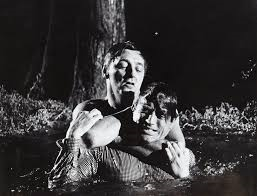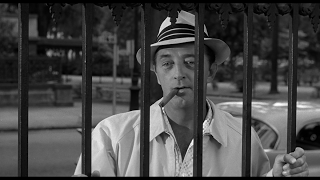
"I got something planned for your wife and kid that they ain't never gonna forget."
Cape Fear (1962) reteams J. Lee Thompson and Gregory Peck, a year after their megahit The Guns of Navarone (1961). That film offers exciting action-adventure, but Cape Fear provides entirely different thrills. It's a clever, compelling tale of a man driven to extremes by his own sense of justice, and a memorably demonic villain.Ex-con Max Cady (Robert Mitchum) arrives in a Georgia town seeking prosecutor Sam Bowden (Gregory Peck), whose testimony condemned Cady to eight years in prison. Cady drifts around town spying out Bowden, his wife Peggy (Polly Bergen) and daughter Nancy (Lori Martin). The police chief (Martin Balsam) is helpless to act, especially after Cady hires an attorney (Jack Kruschen) to claim harassment. Eventually, Bowden decides to lure Cady into a trap at the family houseboat, using his family as bait.
Few films can match Cape Fear's charged atmosphere, provided through its villain. Cady provides an unambiguously sexual menace, strutting about shirtless, threatening rape, beating women and gloating about his untouchability. In his most stomach-churning act, he tries forcing Peggy into consensual sex in exchange for her daughter's life. Cady's a force of nature, instinctual yet smart enough to game the system. Bowden's no better legally trapping him than hiring thugs to shank him beneath the boardwalk.
What can a good man do against this walking nightmare? Cape Fear offers Bowden few choices; his resolve to stay legal steadily erodes, to the point where he considers shooting Cady himself. Cady traps him into public confrontations that raise suspicions, with a lawyer dutifully recording each transgression. He vents his sickness onto troubled girl Diane (Barrie Chase) who refuses to testify against him, and kills Bowden's dog with untraceable poison.

Thompson's direction couldn't be better: photographer Sam Leavitt contrasts the town's sunny climes and its dark interiors; in his panama hat and striped coat, Max seems as misplaced as Michael Myers stalking Laurie Strode. Thompson builds creeping tension, with Nancy fleeing Cady into a basement, Cady glowering demonically over Diane or smearing Peggy with egg yolk. It builds to a faultless finale, as Bowden and Cady try outwitting each other in the titular river, a breathtaking denouement heightened by Leavitt's swirling camerawork and Bernard Hermann's pounding, relentless score.
Gregory Peck is well-cast as a noble attorney pushed to the breaking point. Peck played Atticus Finch the same year; one pictures Bowden as a more desperate version of same, wrestling with his conscience as he plots defying the law. Robert Mitchum never found a role better fitting his devil-may-care masculinity, granting every sneered pleasantry with a leering, homicidal undertow. The supporting cast includes Martin Balsam, Polly Bergen and a young Telly Savalas (with hair!) as a detective, though they're all upstaged by Barrie Chase's tragically pathetic appearance.
For all its twists, Cape Fear never seems contrived or false: it's utterly absorbing from beginning to end. Unusually nuanced depicting a reluctant vigilante against a lawless terror, Thompson's terrifying presentation assures visceral and intellectual satisfaction.

